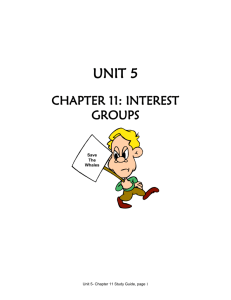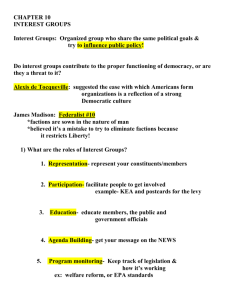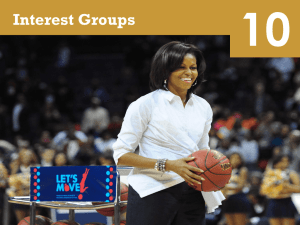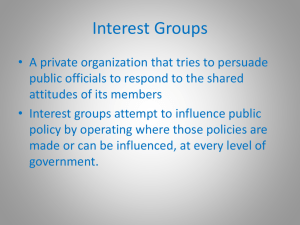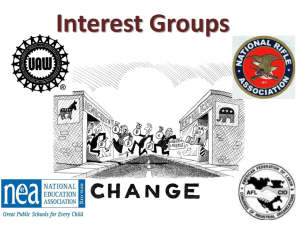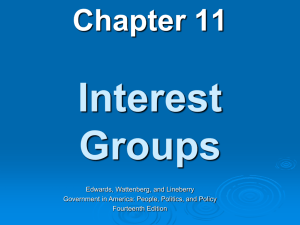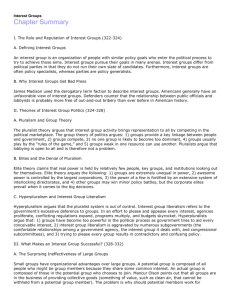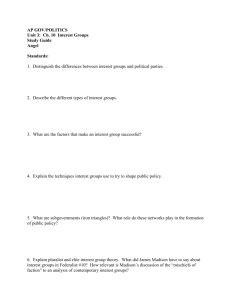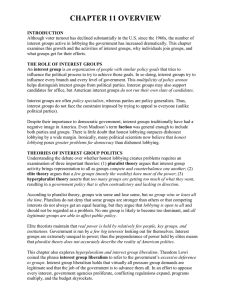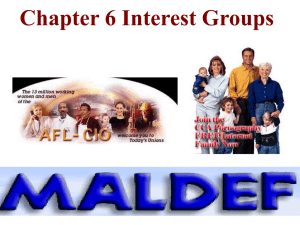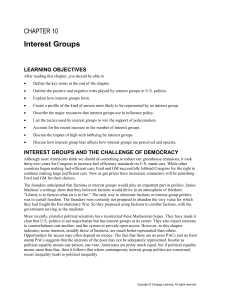The Pluralist Defense of Interest Groups
advertisement
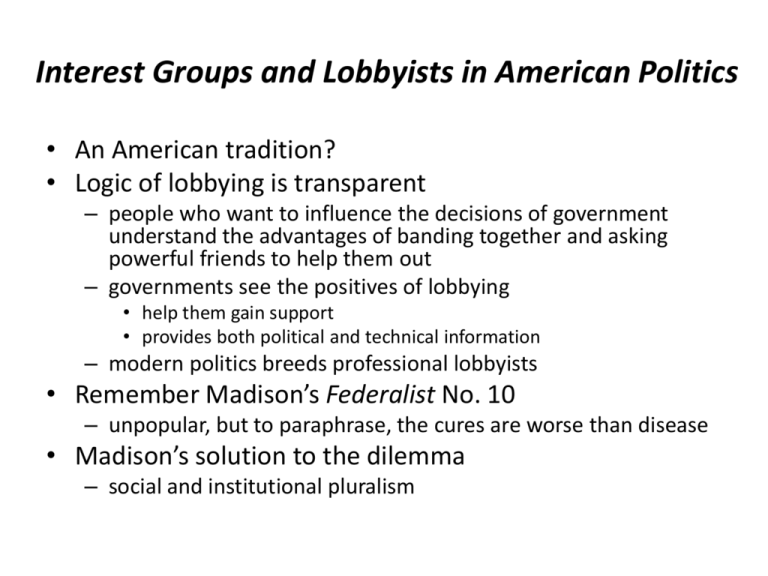
Interest Groups and Lobbyists in American Politics • An American tradition? • Logic of lobbying is transparent – people who want to influence the decisions of government understand the advantages of banding together and asking powerful friends to help them out – governments see the positives of lobbying • help them gain support • provides both political and technical information – modern politics breeds professional lobbyists • Remember Madison’s Federalist No. 10 – unpopular, but to paraphrase, the cures are worse than disease • Madison’s solution to the dilemma – social and institutional pluralism Development of Interest Groups • The colonial era – insider lobbying – public interest lobbying • The early republic – factions flourished – political parties emerged – coordinated efforts emerged to shape government – by 1830s many organizations in America • Tocqueville – initially skeptical then viewed such groups as essential to an egalitarian social and political system • Later observers not so sure – GAR puts drain on federal budget – new groups such as large-scale industrial corporations and trusts engaged in lobbying – their methods are viewed negatively – exposed by “muckrakers” – led to laws regulating child labor, wages and work hours, and so on • Contemporary view? – Unseemly? – Selfish? – Indispensable? The Pluralist Defense of Interest Groups • David Truman’s The Governmental Process (1951) – defense of the legitimate role of interest groups – consequence of economic development • Moreover, the American political system is particularly conducive to pluralist politics. – decentralized – elected officials need to form broad-based coalitions • Idealized conception of system: – Economic competition produces efficient markets, while political competition produces public interest? • Reality: system is biased – money, information, access to authority, skill, bargaining power are distributed unevenly – Advantages the small at the expense of the large? – Schattschneider: “The flaw in the pluralist heaven is that the heavenly chorus sings with a strong upper-class accent.” What Do Lobbyists and Interest Groups Do? • First, they try to survive. – The role of Salisbury’s entrepreneur: examples are Nader and Schlafly – organizations that survive on small contributions and mass membership face particular challenges to organizational maintenance – must focus on the issues that continue to generate contributions – must pursue other means of securing member support • Strategies of Influence: insiders vs. outsiders – – – – – Lobbying Electioneering Grassroots lobbying Litigation Demonstrations (politics out of doors) • Success as a function of goals: – broad vs. narrow/status quo vs. change • Effectiveness and access • Interest group resources: money, information – Money, information, expertise, strategic position, size? The Collective Action Problem: Size =resource? The importance of organization: Potential groups vs. actual groups The nature of collective goods Why pay if you can get it for free? Why pay if your contribution has no effect? Moral 1: Small groups have an advantage How do large groups compensate? Selective incentives and coercion Moral 2: The members of large groups may not care about the groups’ policy goals! (Their reasons for joining may lie elsewhere: unions, farm organizations.) How Public Interest Groups Overcome Free Riding • Why are there so many public interest lobbies? – rationality is overcome by the willingness to contribute to groups espousing causes they care about. – moral incentives – the personal satisfaction of self-expression. • Other large organizations circumvent the collective action problem by offering “selective incentives:” – benefits that can be denied to individuals who do not join and contribute: magazines and baseball caps … The Growth in the Number of Contemporary Interest Groups • Interest group universe is expanding. – many sponsored by institutions such as corporations and labor unions, etc. – government entities (off-loading membership costs) • state and local • colleges and universities • tribes • Patrons • Many prominent public interest groups, are financed mainly by membership dues and small contributions. • Memberships and budgets fluctuate with economic circumstances. Why Have Interest Groups Proliferated? • Social ferment of civil rights and Vietnam eras spawned many organizations that lobbied for change. • Increases in affluence and education of middle class provided growing clientele. • Technological advances made coalescing as a group more possible. • More government leads to more interest groups. Why Have Interest Groups Proliferated? (continued) • Inspiration of rival groups and imitators • Encouragement of the federal government – stimulated the organization of business interests • U.S. Chamber of Commerce • Business Roundtable – encouraged the proliferation of organizations in the nonprofit and public sectors • American Farm Bureau Federation • National Organization for Women • Emergence to defend government programs Fragmentation and Specialization • Fragmentation of old interests – new organizations form when new issues pull old groups apart – farm policy (example= milk producers) – federally sponsored medical research (NIH) • Increasingly complex issues and fragmented policy processes force groups to specialize to be effective • Fragmented policy processes create more opportunities for interest groups Electoral Politics and PACS • Electioneering/PACS – FECA 1971-74 provided incentives for creation of PACs – Explosive Growth of PACS • PACs arise in diverse organizations – labor, corporate, trade/membership/health, personal PACs of MCs • Focus on policy—narrow versus broad – Influence? • formidable barriers • which way does the influence run? The Persistence of Varying Interpretations – Pluralists • There is seldom a single public interest that unites us all • Thus, politics should allow the free interplay of competing interests in the hopes that a rough approximation of the public interest might be produced. – Hyperpluralists • Out of control competition. No integrating set of goals. Inconsistent policy. • Are not some interests more legitimate than others? • Confusion of implementation and administration with policymaking. – Elitists • Little of this activity truly matters. An elite is control of American politics. It sets the agenda and calls the shots.

